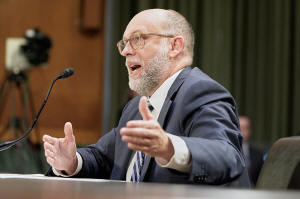Senators challenge Trump's proposed cuts to foreign aid and public media
in contentious hearing
[June 26, 2025]
By KEVIN FREKING
WASHINGTON (AP) — A Senate panel challenged on a bipartisan basis the
merits of cancelling billions of dollars in spending for foreign aid and
public media as part of a contentious hearing Wednesday examining the
White House's request for the cuts.
The House has already voted to claw back $9.4 billion as requested by
President Donald Trump. Now, the Senate is preparing to take up the
package with a July 18 deadline for action. If the Senate declines to
approve a measure by then, the Trump administration must obligate and
spend the funds in question.
Russell Vought, director of the White House Office of Management and
Budget, defended the proposed cuts, which are part of the
administration's efforts to follow through on work done by the so-called
Department of Government Efficiency when it was overseen by billionaire
ally Elon Musk.
“A vote for rescissions is a vote to show that the United States Senate
is serious about getting our fiscal house in order,” Vought told the
lawmakers.
But senators from both parties voiced concerns about the president's
request. Their skepticism suggests that some aspects of the package
could be altered through the amendment process, or that perhaps the bill
will falter entirely.
Maine Sen. Susan Collins, the Republican chair of the Senate
Appropriations Committee, questioned the proposed cuts to both public
media and a program that combats the global HIV epidemic. Holding up a
bottle of vitamins for pregnant moms and a package of peanut
butter-based food supplements for malnourished children, Collins said it
was hard to discern based on the information given lawmakers whether
such aid would continue.
“These are not only the right thing to do for humanitarian reasons, but
they are incredible instruments of soft power,” Collins said.

Vought said lifesaving aid would continue and that the administration
was focused on clawing back the “funding of liberal (non-profit
organizations) doing activities that the American people wouldn't
support.”
Meanwhile, the ranking Democrat on the panel, Washington Sen. Patty
Murray, called on senators to reject the request entirely, saying it
would undermine the committee's influence.
“If we do not reject this recissions package outright and seriously
defend the authority of Congress and the work of this committee, we will
find very quickly our bills become a loss less important and our time is
consumed by more and more rescissions packages,” Murray said.
Collins and other lawmakers with a large rural constituency voiced
concern about what cancelling nearly $1.1 billion for the Corporation
for Public Broadcasting would mean for public media stations throughout
the country. Some of the money is assigned to National Public Radio and
the Public Broadcasting System to support national programming. But
Collins said most goes to locally-owned public radio and television
stations.
[to top of second column]
|

Office of Management and Budget director Russell Vought testifies
during a Senate Appropriations Committee hearing on the rescissions
package on Capitol Hill, Wednesday, June 25, 2025, in Washington.
(AP Photo/Mariam Zuhaib)

“The vast majority of this funding, more than 70%, actually flows to
local television and radio stations,” Collins said.
The White House says the public media system is politically biased
and an unnecessary expense. Vought said he would work with lawmakers
through separate legislation to try and find a way to help local
stations survive. At the same time, he said they would also have
time to adjust to the cut because the rescission covers the coming
two budget years, not the current one.
“We have given an opportunity to work through these things and allow
them to plan accordingly so that they can continue to serve the
communities you represent,” Vought said.
The hearing comes amid increased tensions between the White House
and Congress over the administration's moves to cancel or hold back
funds that were approved on a bipartisan basis. Just this week,
attorneys general from more than 20 states and Washington, D.C.
filed a federal lawsuit challenging billions of dollars in spending
cuts made by the Trump administration that would fund everything
from crime prevention to food security to scientific research.
The lawsuit filed in Boston is asking a judge to limit the Trump
administration from relying on an obscure clause in the federal
regulation to cut grants that don’t align with its priorities. Since
January, the lawsuit argues that the administration has used that
clause to cancel entire programs and thousands of grants that had
been previously awarded to states and grantees.
Sen. Mitch McConnell, R-Ky., was one of the lawmakers who objected
to how the administration has gone about its cost-cutting efforts.
“There's plenty of nonsense masquerading as American aid that
shouldn't receive another bit of taxpayer funding, but the
administration's attempt to root it out has been unnecessarily
chaotic,” McConnell said. “Instead of creating efficiencies, you've
created vacuums for adversaries like China to fill.”
Sen. Eric Schmitt, R-Mo., defended the administration's efforts. He
called the proposed cuts “surgical" and said that funding has gone
to programs that lawmakers never would have allowed if they had
known about the details of the spending.
“Reining in power that the administration state has seized is
critical as we stare down a $37 trillion debt. It is critical in
restoring trust in government,” Schmitt said.
In response to Democratic questioning, Vought committed to lawmakers
that if the Senate does not approve the rescissions package to
cancel the funds, the administration would release the money. That
was an assurance sought by Democratic Michigan Sen. Gary Peters.
All contents © copyright 2025 Associated Press. All rights reserved |